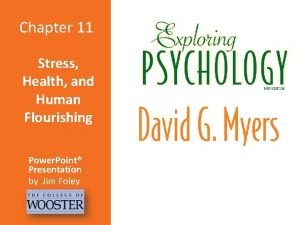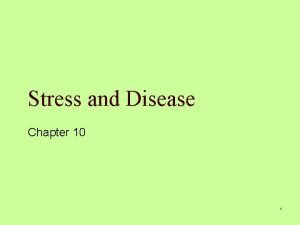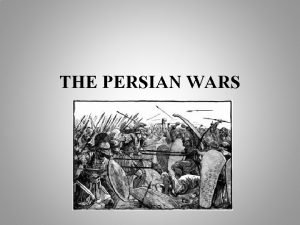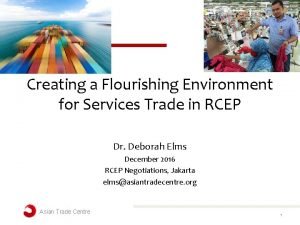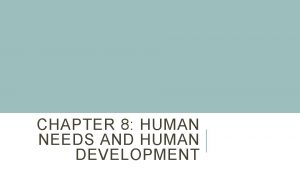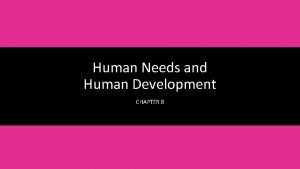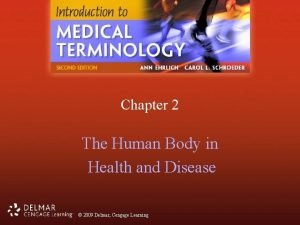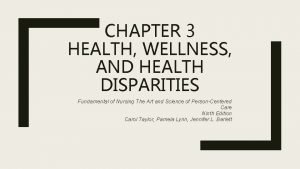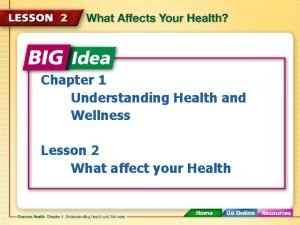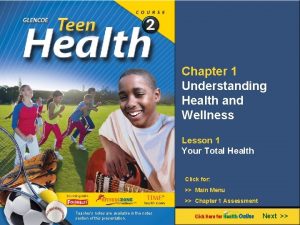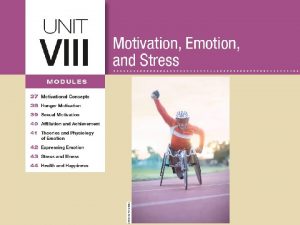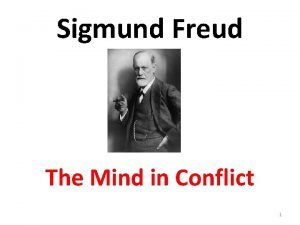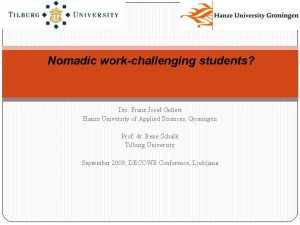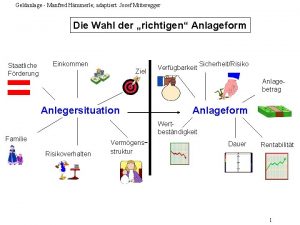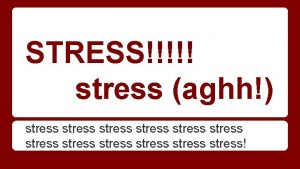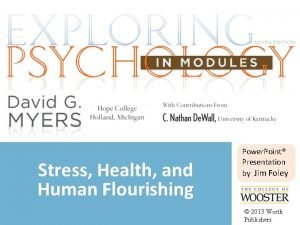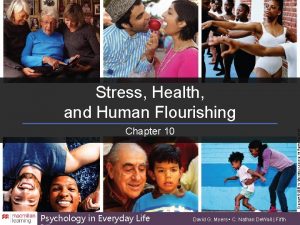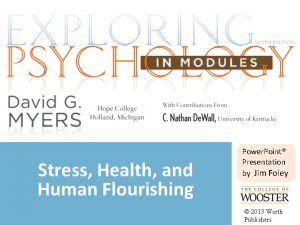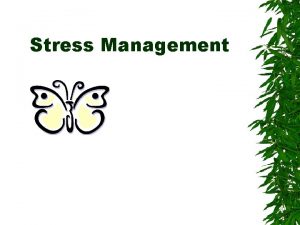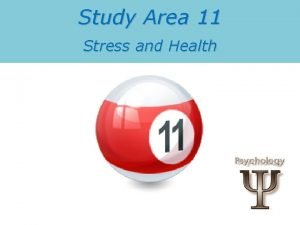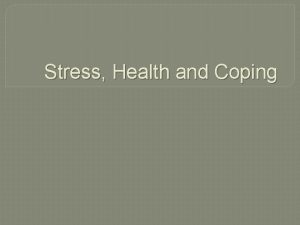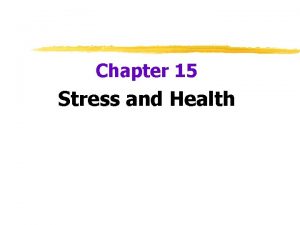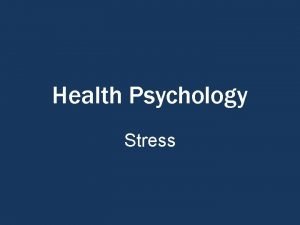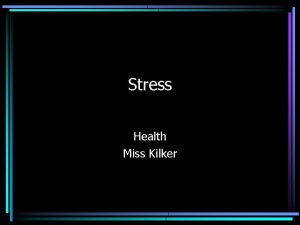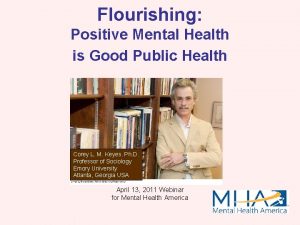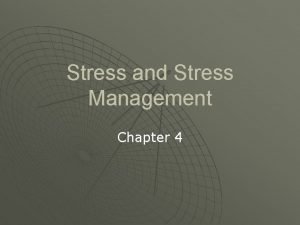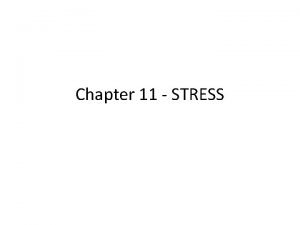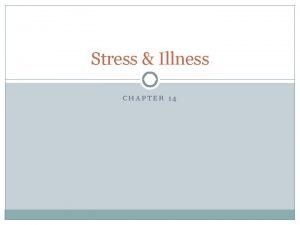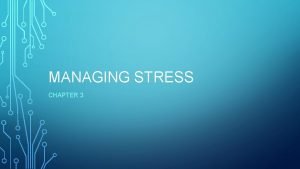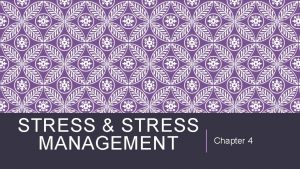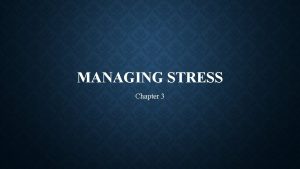Chapter 11 Stress Health and Human Flourishing Josef















































- Slides: 47

Chapter 11 Stress, Health, and Human Flourishing Josef F. Steufer/Getty Images

Chapter Overview • Stress and Illness • Health and Happiness

Stress and Illness Stress: Some Basic Concepts 11 -1: WHAT EVENTS PROVOKE STRESS RESPONSES, AND HOW DO WE RESPOND ADAPT TO STRESS? • Stress is process by which we perceive and respond to certain events, called stressors, that we appraise as threatening or challenging • Stress arises less from the events themselves than from how we appraise them – Stressors appraised as threats can lead to strong negative reactions – Experiencing some stress early in life builds resilience – Extreme or prolonged stress can cause harm

Stress: Some Basic Concepts Stressors—Things That Push Our Buttons Stressors fall into three main types: Catastrophes: Unpleasant, large-scale events • Significant damage to emotional and physical health Significant Life Changes: Personal life transitions • Many significant changes happen during young adulthood • A cluster of crises raises risk of disease and death • Daily Hassles and Social Stress: Day-to-day challenges • Some people more affected by everyday hassles than others, with stress taking a greater toll on their well-being • Some also have various forms of prejudice compounding those daily challenges

Stress: Some Basic Concepts The Stress Response System • Walter Cannon (1929) viewed the stress response as a unified mind-body fight-or-flight system. • Hans Selye (1936, 1976) extended Cannon’s findings, proposing a general three-phase general adaptation syndrome (GAS): – Phase 1: Alarm—sympathetic nervous system activated – Phase 2: Resistance—the body copes with stressor – Phase 3: Exhaustion—body’s reserves get depleted Seyle’s basic point: Although the human body copes well with temporary stress, prolonged stress can damage it.

Stress: Some Basic Concepts The Stress Response System • Selye proposed that the body’s adaptive response to stress is so general that, like a single burglar alarm, it sounds, no matter what intrudes. • There are other ways to deal with stress – Withdrawal is common among those who have lost a loved one – Nurturing and banding together may occur, especially in women (the tend and befriend stress response) – Men more often than women tend to withdraw socially, turn to alcohol, or become aggressive • When stress persists, the result may be lowered resistance to infections and other threats to mental and physical well-being.

Stress: Some Basic Concepts The Stress Response System Selye’s general adaptation syndrome

Stress and Vulnerability to Disease 11 -2: HOW DOES STRESS MAKE US MORE VULNERABLE TO DISEASE? • Health psychology is a subfield of psychology that provides psychology’s contribution to behavioral medicine. • Psychoneuroimmunologists study mind-body interactions, including stress-related physical illnesses, such as hypertension and stress-induced headaches. • Stress diverts energy from the immune system, inhibiting the activities of its B and T lymphocytes, macrophages, and NK cells. • Stress does not cause diseases such as AIDS and cancer, but by altering our immune functioning it may make us more vulnerable to them and influence their progression.

Stress and Vulnerability to Disease Psychoneuroimmunology: Studies our mind-body interactions Thoughts and emotions (psycho) which controls the stress hormones that influence your diseasefighting immune system. affect your brain (neuro) This field is the study of (ology) those interactions.

Stress and Vulnerability to Disease • Four types of cells are active in the search-and-destroy mission of the immune system: – B lymphocytes—mature in the bone marrow and release antibodies that fight bacterial infections – T lymphocytes—mature in the thymus and other lymphatic tissue and attack cancer cells, viruses, and foreign substances – Macrophages—identify, pursue, and ingest harmful invaders and worn-out cells – Natural killer cells (NK cells)—pursue diseased cells (such as those infected by viruses or cancer)

Stress and Vulnerability to Disease • Immune system activity is affected by – Age – Nutrition – Genetics – Body temperature – Stress • When the immune system does not function properly, it can err in one of two directions: – Responds too strongly – Doesn’t respond strongly enough

Stress and Vulnerability to Disease Overreaction May Result in • Self-attacking diseases • Some forms of arthritis • Allergic reaction Underreaction May Result in • Bacterial infection flare-up • Dormant virus eruption • Cancer cells multiplying

Stress and Vulnerability to Disease • Stress hormones suppress immune system. Research has shown this in – Animal studies: Stress of social disruption in monkeys caused weakened immune systems – Human studies: Stress caused slower surgical wound healing, greater vulnerability to colds, and decreased effectiveness of flu vaccines The point to remember: Stress does not make people sick but it reduces immune system’s ability to function optimally

Stress and Vulnerability to Disease Stress and AIDS • We know that stress suppresses immune system functioning, so what does this mean for people with AIDS (acquired immune deficiency syndrome)? – As its name tells us, AIDS is an immune disorder, caused by the human immunodeficiency virus (HIV). – Stress cannot give people AIDS, but may speed transition from HIV infection to AIDS and the decline in those with AIDS. – Worldwide efforts to reduce stress have had some modest positive consequences for HIV-positive people.

Stress and Vulnerability to Disease Stress and Cancer • Stress does not create cancer cells. But in a healthy, functioning immune system, lymphocytes, macrophages, and NK cells search out and destroy cancer cells and cancer-damaged cells. If stress weakens the immune system, might this weaken a person’s ability to fight off cancer? – Stress-cancer research results mixed, with some studies finding greater risk for people within a year of experiencing depression, helplessness, or bereavement, but others not. – Stress may affect growth by weakening the body’s natural defenses.

Stress and Vulnerability to Disease Stress and Heart Disease 11 -3: WHY ARE SOME OF US MORE PRONE THAN OTHERS TO CORONARY HEART DISEASE? – Coronary heart disease: The clogging of the vessels that nourish the heart muscle; the leading cause of death in many developed countries. – About U. S. 610, 000 coronary heart disease-related deaths yearly (CDC, 2015). – Stress and personality play a role in heart disease. The more psychological trauma people experience, the more their bodies generate inflammation, which is associated with heart and other health problems. Let’s take a closer look at personality factors.

Stress and Vulnerability to Disease Stress and Heart Disease Type A Personality – Classic study by Meyer Friedman and colleagues (Friedman & Ulmer, 1984) • Tested the idea that stress increases heart disease risk by measuring blood cholesterol level and clotting speed • Stress predicted heart attack risk for tax accountants • Type A men more likely to have heart attack • Not one of the “pure” Type B suffered a heart attack • Blood pressure also rises as students approach stressful exams (Conley & Lehman, 2012)

Stress and Vulnerability to Disease Stress and Heart Disease Type A Type B Type D • Friedman and Rosenman’s term for competitive, hard-driving, impatient, verbally aggressive, and angerprone people • Friedman and Rosenman’s term for easy going, relaxed people • More recent term, used for people who suppress negative emotion to avoid social disapproval (Grande et al. , 2012)

Stress and Vulnerability to Disease Stress and Heart Disease • Effects of Pessimism and Depression – Pessimists more than twice as likely as optimists to develop heart disease – Depression increases risk of death, especially by cardiovascular disease • Stress and Inflammation – Chronic stress triggers persistent inflammation which increases risk of heart disease and depression • Much greater risk of heart attacks among middle-aged American women facing significant work stress • Also greater for Danish nurses reporting work pressure • And middle-aged American workers facing involuntary job loss has more than doubled risk of a heart attack

Stress and Vulnerability to Disease Stress and Heart Disease Pessimism and Heart Disease

Stress and Vulnerability to Disease Stress and Heart Disease Stress can have a variety of health-related consequences

Stress and Vulnerability to Disease Stress and Heart Disease Anger Management 11 -4: HOW DO STRATEGIES FOR HANDLING ANGER COMPARE IN THEIR EFFECTIVENESS? Catharsis: In psychology, the idea that “releasing” aggressive energy (through action or fantasy) relieves aggressive urges. Experts offer three suggestions to manage anger: – Wait: Emotional arousal will decrease if you wait just long enough. – Find a healthy distraction or support: Exercise, play an instrument, talk to a friend. – Distance yourself: Try to move away from the situation mentally. • When someone’s behavior is really hurtful, follow the ageold advice to forgive—it releases anger and calms the body.

Health and Happiness Coping With Stress 11 -5: IN WHAT TWO WAYS DO PEOPLE TRY TO ALLEVIATE STRESS? • Coping: Reducing stress using emotional, cognitive, or behavioral methods – Problem-focused coping: Attempting to reduce stress directly—by changing the stressor or the way we interact with that stressor. – Emotion-focused coping: Attempting to reduce stress by avoiding or ignoring a stressor and attending to emotional needs related to our stress reaction.

Health and Happiness: Coping With Stress Personal Control 11 -6: HOW DOES A PERCEIVED LACK OF CONTROL AFFECT HEALTH? • In humans and other animals, uncontrollable threats trigger the strongest stress responses: – Animal studies • Laudenslager and Reite (1984) rat studies • Seligman and colleagues (1967) dog studies • Learned helplessness: The hopelessness and passive resignation an animal or person learns when unable to avoid repeated aversive events. – Human studies • Rodin (1986) nursing home resident study • O’Neill (1993) work site environment studies • Increasing control noticeably improves health and morale.

Learned Helplessness Generalized helpless behavior Uncontrollable bad events Perceived lack of control

Coping With Stress Personal Control • Why does perceived loss of control predict health problems? – Losing control produces an outpouring of stress hormones. – When rats cannot control shock or when humans or other primates feel unable to control their environment, the result is rising stress hormones blood pressure levels increase immune responses drop. • By boosting feelings of control, people often lead happier and healthier lives.

Coping With Stress Personal Control Internal Versus External Locus of Control • If experiencing a loss of control can be stressful and unhealthy, do people who generally perceive they have control of their lives enjoy better health? – Those who have an external locus of control believe that chance or outside forces control their fate. – Those who have an internal locus of control believe they control their own destiny. • Studies show that people who believe in their freedom learn better, perform better at work, behave more helpfully, and have a stronger desire to punish rule breakers (Clark et al. , 2014; Job et al. , 2010; Stillman et al. , 2010).

Coping With Stress Personal Control 11 -7: HOW CAN OUR SELF-CONTROL BE DEPLETED, AND WHY IS IT IMPORTANT TO BUILD THIS STRENGTH? Depleting and Strengthening Self-Control • Self-control: Ability to control impulses and delay shortterm gratification for greater long-term rewards • Exercising willpower temporarily depletes the mental energy needed for self-control on other tasks. But the long-term effect of exercising self-control is strengthened self-control, much as hard physical workouts leave you temporarily tired but stronger in the long term. • Self-control requires attention and energy, but it predicts good adjustment, better grades, and social success.

Coping With Stress Explanatory Style: Optimism Versus Pessimism 11 -8: HOW DOES AN OPTIMISTIC OUTLOOK AFFECT HEALTH AND LONGEVITY? • Pessimists – Expect things to go badly; blame themselves, others or situations beyond their control • Optimists – Expect to have control, work well under stress, and enjoy good health – Enjoy better moods, stronger immune systems, quicker recovery times, longer lives, and better well-being and success overall – Optimism runs in families; one genetic marker is a gene that enhances the social-bonding hormone oxytocin • Even the most pessimistic of us can learn to become more optimistic; in one such study pessimists reported lower levels of depression

Coping With Stress Social Support 11 -9: HOW DOES SOCIAL SUPPORT PROMOTE GOOD HEALTH? • Social support itself creates health benefits: – It calms us and reduces blood pressure and stress hormones. – It fights illness by fostering stronger immune functioning. – Close relationships give us an opportunity for “open heart therapy, ” a chance to confide painful feelings.

Health and Happiness Reducing Stress • Having a sense of control, developing more optimistic thinking, and building social support can help us experience less stress and thus improve our health. But sometimes we cannot alleviate stress and simply need to manage our stress. • Aerobic exercise, relaxation, meditation, and active spiritual engagement may help us gather inner strength and lessen stress effects. Based on what we have learned so far, can you guess why that might be?

Health and Happiness Reducing Stress Aerobic Exercise 11 -10: HOW EFFECTIVE IS AEROBIC EXERCISE AS A WAY TO MANAGE STRESS AND IMPROVE WELLBEING? • Aerobic exercise: Sustained activity that increases heart and lung fitness; may also reduce depression and anxiety – Increases the quality and quantity of life (two additional years, on average) – Boost in quality of life seen in increased energy, better mood, and stronger relationships

Aerobic Exercise and Depression Mildly depressed college women who participated in an aerobic exercise program showed markedly reduced depression, compared with those who did relaxation exercises or received no treatment. (From Mc. Cann & Holmes, 1984. )

Reducing Stress Relaxation and Meditation 11 -11: IN WHAT WAYS MIGHT RELAXATION AND MEDITATION INFLUENCE STRESS AND HEALTH? • Much research done starting in the late 1960 s on biofeedback. It is now is thought to have limited effect, working best on tension headaches. • More than 60 studies have found that relaxation procedures can help alleviate headaches, high blood pressure, anxiety, and insomnia. • Relaxation training has been used to help Type A heart attack survivors reduce risk of future heart attacks. • Mindfulness meditation: Relaxing and silently attending to your inner state, without judging it. • Strengthens connections among regions in the brain • Activates brain regions associated with more reflexive awareness • Calms brain activation in emotional situations

Reducing Stress Faith Communities and Health 11 -12: WHAT IS THE FAITH FACTOR, AND WHAT ARE SOME POSSIBLE EXPLANATIONS FOR THE LINK BETWEEN FAITH AND HEALTH? • The faith factor: Religiously active people tend to live longer than those who are not religiously active. – This is correlational, not cause-effect. Nevertheless, research indicates that religious involvement, like nonsmoking and exercise, is a predictor of health and longevity. – Possible explanations may include the effect of intervening variables, such as the healthy behaviors, social support, or positive emotions often found among people who regularly attend religious services.

Reducing Stress Faith Communities and Health

Health and Happiness 11 -13: WHAT IS THE FEEL-GOOD, DO-GOOD PHENOMENON, AND WHAT IS THE FOCUS OF POSITIVE PSYCHOLOGY RESEARCH? • People aspire to happiness because our state of happiness or unhappiness influences all facets of life. • Feel-good, do-good phenomenon: People’s tendency to be helpful when already in a good mood. • Doing good also promotes good feeling, the do-good, feel-good phenomenon.

Health and Happiness Positive Psychology • Happiness research stems from William James’ writings in the early twentieth century through to the humanistic psychologists interest in advancing human fulfillment in the 1960 s. In the twenty-first century, positive psychologists under the leadership of Martin Seligman have used scientific methods to study human flourishing. • Subjective well-being • Self-perceived happiness or satisfaction with life • Used along with measures of objective well-being (for example, physical and economic indicators) to evaluate people’s quality of life

Happiness Positive Psychology Positive psychology • Scientific study of human functioning, with the goals of discovering and promoting strengths and virtues that help individuals and communities to thrive. Three pillars of positive psychology • Positive well-being • Positive character • Positive groups, communities, and cultures

Happiness What Affects Our Well-Being? 11 -14: HOW DO TIME, WEALTH, ADAPTATION, AND COMPARISON AFFECT OUR HAPPINESS LEVELS? The Short Life of Emotional Ups and Downs • Emotional ups and downs tend to balance out; moods typically rebound. • Friday and Saturday are the most positive mood days. • Early morning to midday are the most positive times of day. • Usually, even tragedy is not permanently depressing. The surprising reality: The duration of emotions is overestimated; resiliency and adaptability are underestimated.

Happiness What Affects Our Well-Being? Wealth and Well-Being • Wealth does correlate with well-being in some ways. – Having resources to meet basic needs and maintain some control over life does buy happiness. – Increasing wealth matters less once basic needs are met. – Economic growth in affluent countries provides no apparent morale or social well-being boost.

Happiness What Affects Our Well-Being? Happiness Is Relative: Adaptation and Comparison – Our emotions seem like elastic bands that pull us back from highs and lows. – Happiness is relative to our own experiences (the adaptation-level phenomenon) and to others’ success (the relative deprivation principle). • Feelings of satisfaction and dissatisfaction, success and failure are judgments we make based partly on our prior experience. • Comparing ourselves with those who are better off creates envy, but counting our blessings as we compare ourselves with those worse off boosts our contentment.

Happiness What Affects Our Well-Being? Adaptationlevel phenomenon Relative deprivation • The tendency to form judgments (of sounds, of lights, of income) relative to a neutral level defined by our prior experience. Partly influences feelings of satisfaction and dissatisfaction, success and failure. • The perception that one is worse off relative to those with whom one compares oneself. Satisfaction may come when one feels better off than peers.

Happiness What Predicts Our Happiness Levels? 11 -15: WHAT ARE SOME PREDICTORS OF HAPPINESS, AND HOW CAN WE BE HAPPIER? • Happiness levels are product of nature–nurture interaction. – Twin studies: About 50 percent of happiness rating differences among people seems to be heritable— attributable to genes. – Personal history: Emotions balance around a level defined by experience; happiness set point. – Culture: There is diversity in the value groups place on various traits (for example, social acceptance and harmony in collectivist cultures and self-esteem and achievement in individualist cultures). • Individual happiness level may influence national well-being.

Happiness What Predicts Our Happiness Levels? Happiness Is. . .

Happiness Evidence-Based Suggestions for a Happier Life Eleven research-based suggestions for improving your mood and increasing your satisfaction with life: 1. Realize that enduring happiness may not come from financial success 2. Take control of your time 3. Act happy 4. Seek work and leisure that engage your skills 5. Buy shared experiences rather than things 6. Join the “movement” movement

Happiness Evidence-Based Suggestions for a Happier Life Research-based suggestions for improving your mood and increasing your satisfaction with life (continued): 7. Give your body the sleep it wants 8. Give priority to close relationships 9. Focus beyond self 10. Count your blessings and record your gratitude 11. Nurture your spiritual self
 Stress health and human flourishing
Stress health and human flourishing Human flourishing nursing examples
Human flourishing nursing examples Human flourishing definition
Human flourishing definition Chapter 10 stress responses and stress management
Chapter 10 stress responses and stress management Flourishing under fire
Flourishing under fire When did the sea roads start
When did the sea roads start By about what year were greek city-states flourishing?
By about what year were greek city-states flourishing? Flourishing environment
Flourishing environment True strain equation
True strain equation What is the definition of axial stress
What is the definition of axial stress Human needs and human development
Human needs and human development Chapter 8 human needs and human development
Chapter 8 human needs and human development The human body in health and disease chapter 2 answer key
The human body in health and disease chapter 2 answer key The human body in health and disease chapter 2 answer key
The human body in health and disease chapter 2 answer key Chapter 2 the human body in health and disease
Chapter 2 the human body in health and disease Chapter 3 health wellness and health disparities
Chapter 3 health wellness and health disparities Chapter 1 understanding health and wellness lesson 2
Chapter 1 understanding health and wellness lesson 2 Chapter 1 lesson 1 your total health
Chapter 1 lesson 1 your total health Module 43 stress and health
Module 43 stress and health Velké, širé, rodné lány rozbor
Velké, širé, rodné lány rozbor Franz josef och
Franz josef och Franz josef och
Franz josef och Background of sigmund freud
Background of sigmund freud Drachenfeuer hohlbein zusammenfassung
Drachenfeuer hohlbein zusammenfassung Sage der basilisk arbeitsblatt
Sage der basilisk arbeitsblatt Josef guggenmos löwenzahn
Josef guggenmos löwenzahn Josef kote peintre
Josef kote peintre Josef jungmann prezentace
Josef jungmann prezentace Who is stalin in animal farm
Who is stalin in animal farm Lombroso verbrechertypen
Lombroso verbrechertypen Franz josef gellert
Franz josef gellert Karmel hannover
Karmel hannover Veranlagungspyramide
Veranlagungspyramide Josef muller brockmann beethoven
Josef muller brockmann beethoven Josef bei potifar grundschule
Josef bei potifar grundschule Josef sibille
Josef sibille 5 schritt lesemethode beispieltexte
5 schritt lesemethode beispieltexte Josef hallberg
Josef hallberg Jerome believes that his 4-year-old grandson
Jerome believes that his 4-year-old grandson Josef blean
Josef blean Banská bystrica
Banská bystrica Ijc domy
Ijc domy Personalbedarfsplanung hotel
Personalbedarfsplanung hotel Hans-josef klauck
Hans-josef klauck Mone schule bad schönborn
Mone schule bad schönborn Josef istler
Josef istler Josef mathauser
Josef mathauser Josef fritzl
Josef fritzl
